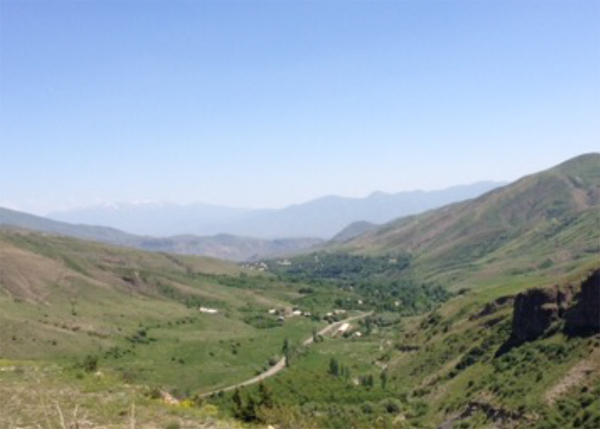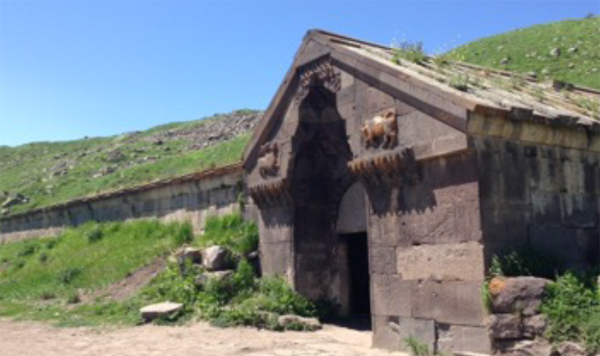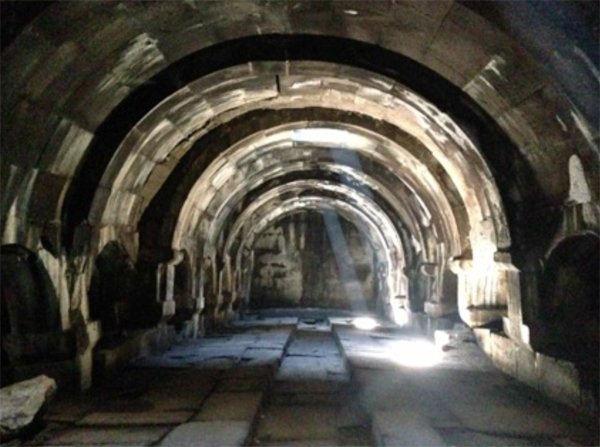Here is the Silk Road to the Selim Pass (height of 2410 meters above sea level) used for transportation of goods since 200BC (I may be wrong, but who of you would argue with me). It is almost scary to think that even before our Godfather Czech made it to ancient Bohemia, traders with caravans of camels and horses were climbing the same pass.

Just south of the pass the family of local oligarchs, the Orbelians, built in 1332.

this beautiful caravanserai (a hotel) for travelers and caravan proprietors who

could stay here overnight in the shelter of its wing even with horses and camels before crossing the Selim Pass the next morning refreshed. It is nice to see that stone arches of the caravanserai built from blocs of basalt survived almost 700 years without any maintenance in such good shape that if it were not for the modern road and huge trucks on it, this caravanserai would still be operational and full of people and camels. Which one could hardly say about the new road after only ten years of use.
If you enjoy soap operas continue reading the bold script insert.
Now, the Orbelians were actually not Armenians but Georgians and had a fortress in Southern Georgia just north of Armenian teritory. Their leader Ivane made a wrong choice in support of his son in law Demetre, a deceased Georgian king’s young son and heir in the fight with the king’s brother (and Demetre’s uncle) Grigor. Ivane sent his own brother Liparit and nephews Elikum and Ivane to the Persians in Tabriz for help, but this was a long way off and with no fast trains or planes the new army travelled on foot and came too late. By the time they arrived in Georgia, Ivane had been blinded, his family strangled, and young Demetre blinded and for good measure castrated. Lovely family, indeed.
What became of the rest of the guys who ran for help? Well, they were not as stupid as to return with the army to fight, they stayed behind with their powerful friends. Like in a good soap opera we have deaths, marriages and as it happened in those olden times even religious conversions. Ivane’s brother Liparit died in exile. The first nephew Ivane, came back to Georgia to his dwindling estates when the situation cooled down. The other nephew Elikum stayed in Persia and became an important official, converting (halfheartedly and maybe not at all) from Christianity to Islam and dying in one of the wars. He left behind a widow, sister of an Armenian Christian bishop of Syunik, and a young son Liparit, named after, of course, his grandad. As women and widows in particular had not much to say in those trivial matters such as who they will marry, they quickly became, involuntarily, the wife and stepson of a Muslim notable. Wait, the soap opera continues!
In the next season the combined Georgian and Armenian army under another Ivane wrested control of Syunik from the Muslims. Remembering the Orbelians Ivane made a search, located Liparit thanks to the bishop, his mom’s brother, and established him as feudal lord. Bolstered by marriage alliances with its feudal relations, the Orbelians flourished, building or supporting a network of fine monasteries and caravanserais, too.
Wait, the ratings are good, we need to extend the soap opera for anoter season. But we need a twist in the plot, an external force that brings forth some challenges for our heros. It comes in the form of Mongols. Our hero, the sharp and multi-lingual Orbelian prince Smbat makes an arduous pilgrimage to Karakorum, armed with a splendid jewel and divine blessing, and persuades Möngke Khan, son of Genghis, the Mongol ruler, to make Syunik and its churches a tax-exempt fiefdom. It does help that Mangu’s mother is a Christian. Indeed, there is another soap opera in early stages of production and it talks about the Mongol kingdom, their expansion and conversion to Islam, with soecial appearances of strong and beautiful Mongol queens, but that is a story for another day.
It was here in the flat and vast Selim Pass were the strange ticking sound came back and I found the source of it. It was the dashboard temperature indicator that was oscillating with regular frequency between 90C and red area above 130C. If the temperature shown was correct the cooler of our car was close to explosion. My wife became quite concerned that should we explode close to the Azerbaijan border, Turkish border or any building of the ruling party or house of a relative of Mr. President such event would qualify as a terrorist act and we would be thrown in jail and die, or be investigated and die, or be tried for treason and die or shot on the spot whichever came first. Under such challenging circumstances I agreed that we should inform local authorities of our indicator problems or seek qualified help at the nearest gas (or as they say „benzin“) station. So as soon as we saw one we stopped and there we found 3 young guys and one older one smoking extensively between the pools of benzin on the station’s unpaved ground. From safer distance of thirty feet (10m) I tried to call to the older gentleman but before I could pull the window down all 3 youngsters were opening my door hoping to sharpen their Russian language skills. When they heard of our little problem they started moving different levers in the car but were not up to the task of finding the source of temperature indicator’s behavior. So they immediately got on their cell phones to call for help to their friends. Meanwhile the smoking elder guy finally got involved and asked me to lift the hood, alternatively to switch the engine on and off, still smoking profusely with one hand and putting his other bare hand on different parts of our Russian tank’s internal organs and piping and when he did not get barbecued he stated his judgment with full authority of the village elder:
„Temperatura ni bolšaya!“ (The temperature is OK!).
I could hear my wife’s loud sigh of relief.
Meanwhile encouraged by younger guys‘ phone calls the number of both experts and just interested parties increased and the number of assistants rose to 24. Then somebody suggested the problem might be electrical so they started feverishly disconnecting and reconnecting not only all wires I knew about but many more I did not have a clue this sophisticated product of famous Russian automobile industry could have. But when elder guy with a lit cigarette permanently attached to the corner of his mouth started checking the level of our fuel tank and in my peripheral vision I registered a policeman closing on our group, by now larger than what would be considered a peaceful protest against the government I thanked everyone in all available languages; Armenian, English and Russian (shnolurak alizyun, thanks and spasiba), we jumped into our car and sped away hoping that the thermal indicator troubles may be the least of our problem on the way to Lake Sevan.

